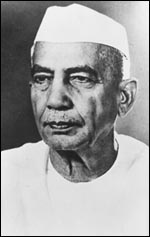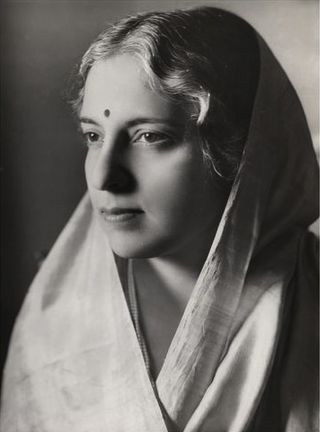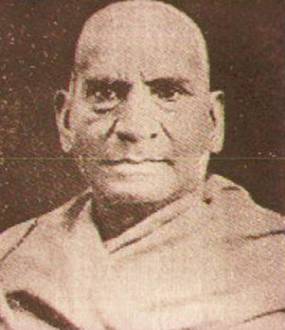Related Research Articles

Chaudhary Charan Singh served as the 5th prime minister of India between 28 July 1979 and 14 January 1980. Historians and people alike frequently refer to him as the 'champion of India's peasants'.
The Chandni Chowk is one of the oldest and busiest markets in Old Delhi, India. It is located close to the Old Delhi Railway Station. The Red Fort monument is located at the eastern end of Chandni Chowk. It was built in the 17th century by the Mughal Emperor of India, Shah Jahan, and designed by his daughter, Jahanara. The market was once divided by canals to reflect moonlight. It remains one of India's largest wholesale markets.

Vijaya Lakshmi Pandit was an Indian freedom fighter, diplomat and politician. She served as the 8th President of the United Nations General Assembly from 1953 to 1954, the first woman appointed to either post. She was also the 3rd Governor of Maharashtra from 1962 to 1964. Noted for her participation in the Indian independence movement, she was jailed several times during the movement.

Lala Lajpat Rai was an Indian freedom fighter, politician, and author, generally known as Lala Lajpat Rai. He was popularly known as Punjab Kesari, and also as 'Punjab da Sher' which literally means the 'Lion of Punjab'. He was one of the three members of the Lal Bal Pal trio. He died of severe head trauma injuries sustained 18 days earlier during a baton charge by police in Lahore, when he led a peaceful protest march against the all-British Simon Commission Indian constitutional reforms.

Aruna Asaf Ali was an Indian educator, political activist, and publisher. An active participant in the Indian independence movement, she is widely remembered for hoisting the Indian National flag at the Gowalia Tank maidan, Bombay during the Quit India Movement in 1942. Post-independence, she remained active in politics, becoming Delhi's first Mayor.
Chowk may refer to:

Vijay Goel is an Indian politician and a former Minister of State for Parliamentary Affairs and Statistic and Implementation in the NDA government. A former Minister of Youth Affairs and Sports, Goel is affiliated with the Bharatiya Janata Party (BJP). He became president of the Delhi unit of the BJP in February 2013. He was elected to Rajya Sabha from Rajasthan in 2014.

Sir Chintaman Dwarakanath DeshmukhICS was an Indian civil servant and the first Indian to be appointed the Governor of the Reserve Bank of India in 1943 by the British Raj authorities. He subsequently served as the Finance Minister in the Union Cabinet (1950–1956). It was during this time that he also became a founding member of the Governing Body of NCAER, the National Council of Applied Economic Research in New Delhi, India's first independent economic policy institute established in 1956 at the behest of Prime Minister Jawaharlal Nehru. After resignation from Union Cabinet he worked as Chairman of UGC (1956–1961). He served as Vice-Chancellor of University of Delhi (1962–67). He was also President of Indian Statistical Institute from 1945 to 1964, Honorary Chairman of National Book Trust (1957–60).

Giani Gurmukh Singh Musafir was an Indian politician and Punjabi language writer. He was the Chief Minister of Punjab from 1 November 1966 to 8 March 1967.

Swami Shraddhanand, also known as Mahatma Munshi Ram Vij, was an Arya Samaj sannyasi and an Indian Independence activist who propagated the teachings of Dayananda Saraswati. This included the establishment of educational institutions, like the Gurukul Kangri University, and played a key role on the Sangathan and the Shuddhi (purification), a Hindu reform movement in the 1920s.

Chandni Chowk Lok Sabha constituency is one of the seven Lok Sabha (parliamentary) constituencies in the Indian National Capital Territory of Delhi. This constituency came into existence in 1956.
Brij Krishna Chandiwala was an Indian freedom fighter from Delhi and a political associate of Mahatma Gandhi who was awarded the Padma Shri in 1963 for his contributions to the field of social work.
Dr. Shaukatullah Shah Ansari was an Indian politician, physician, diplomat, and physician who was elected to the Indian Parliament from the Bidar parliamentary constituency for the first Lok Sabha of India.
Vishwa Kumar Gupta, is an Indian homoeopathic physician and former Principal of the Nehru Homoeopathic Medical College, New Delhi. The Government of India honoured him, in 2013, by awarding him the Padma Shri, the fourth highest civilian award, for his contributions to the field of medicine.
Jugal Kishore (1915–2012) was an Indian homoeopathic physician and the founder Director of Nehru Homoeopathic Medical College and Hospital, New Delhi, a Government of Delhi undertaking. He was honored by the Government of India, in 2012, with the fourth highest Indian civilian award of Padma Shri.

Krishna Gopal Saxena (1912–2003) was an Indian homoeopathic physician. Born on 25 September 1912 in Delhi, he did his schooling at Karachi and Ambala and graduated in homoeopathic medicine from the Calcutta Homoeopathic Medical College.
Kalyan Banerjee is an Indian homoeopath from New Delhi. An alumnus of the Mihijan Institute of Homeopathy, he founded the Dr. Kalyan Banerjee Clinic, a homoeopathic healthcare centre based in Chittaranjan Park, New Delhi, in 1977. He has been associated with several government agencies such as the Central Council for Research in Homoeopathy at the Ministry of Health and Family Welfare and was formerly a member of its Governing Council, and the Central Council for Research in Homoeopathy (CCRH) of the Ministry of AYUSH, with a seat in the Homeopathic Pharmacopoeia Committee and the Standing Finance Committee. In 2009, the Government of India awarded him the Padma Shri, the fourth highest civilian honour, for his work in the field of medicine.

Prithvi Singh Azad (1892–1989) was an Indian independence activist, socialist revolutionary and one of the founder members of Ghadar Party. He suffered incarceration several times during the pre-independence period, including a term in the Cellular Jail. The Government of India awarded him the third highest civilian honour of the Padma Bhushan, in 1977, for his contributions to society.
Anil Kumari Malhotra is an Indian homoeopathic physician and the principal of Nehru Homoeopathic Medical College and Hospital of Delhi University. She is an alumnus of the Shri Sai Nath Post Graduate Institute of Homeopathy from where secured MD in homoeopathy in 2006 and has been holding the position of the principal of Nehru Medical College since 1 August 2007. She is known to have published several medical papers, has conducted medical workshops, featuring her presentations and participated in many continuing medical education programs. The Government of India awarded her the fourth highest civilian honour of the Padma Shri, in 2016, for her contributions to medicine.

Nehru Homeopathic Medical College (NHMC) is a homeopathic medical college located in New Delhi. The college offers two courses in the field of homeopathic education A Bachelor of Homeopathic Medicine and Surgery (B.H.M.S) and MD (Hom). NHMC has been affiliated with University of Delhi since 1992 and functions under the Government of Delhi. It is regarded as one of the topmost and premier Homeopathic Medical Colleges for B.H.M.S in India.
References
- 1 2 3 4 5 Nehru Memorial Museum and Library. NMML Manuscripts: An Introduction . New Delhi: Nehru Memorial Museum and Library, 2003. p. 516
- 1 2 3 Directory & Who's Who of Homeopathic Practitioners . New Delhi: B. Jain, 1970. pp. 93, 119
- ↑ The Times of India Directory and Year Book Including Who's Who . Bombay: Bennett, Coleman & Co, 1954. p. 840
- ↑ Hansen, Kathryn. Stages of Life: Indian Theatre Autobiographies . [S.l.]: Anthem Press, 2013. pp. 57, 60
- 1 2 Taneja, Anup. Gandhi, Women, and the National Movement: 1920 - 47 . New Delhi: Har-Anand Publ, 2005. p. 149
- ↑ Election Commission of India. STATISTICAL REPORT ON GENERAL ELECTION, 1951 TO THE LEGISLATIVE ASSEMBLY OF DELHI
- ↑ Chander, Jag Parvesh. Remedy for Delhi's Ills . Delhi: Metropolitan Book Co, 1975. p. 5
- ↑ Dilli Homoeopathic Anusandhan Parishad. Development of Homoeopathy in Delhi
- ↑ "Padma Awards Directory (1954–2014)" (PDF). Ministry of Home Affairs (India). 21 May 2014. pp. 47, 70. Retrieved 23 March 2016.